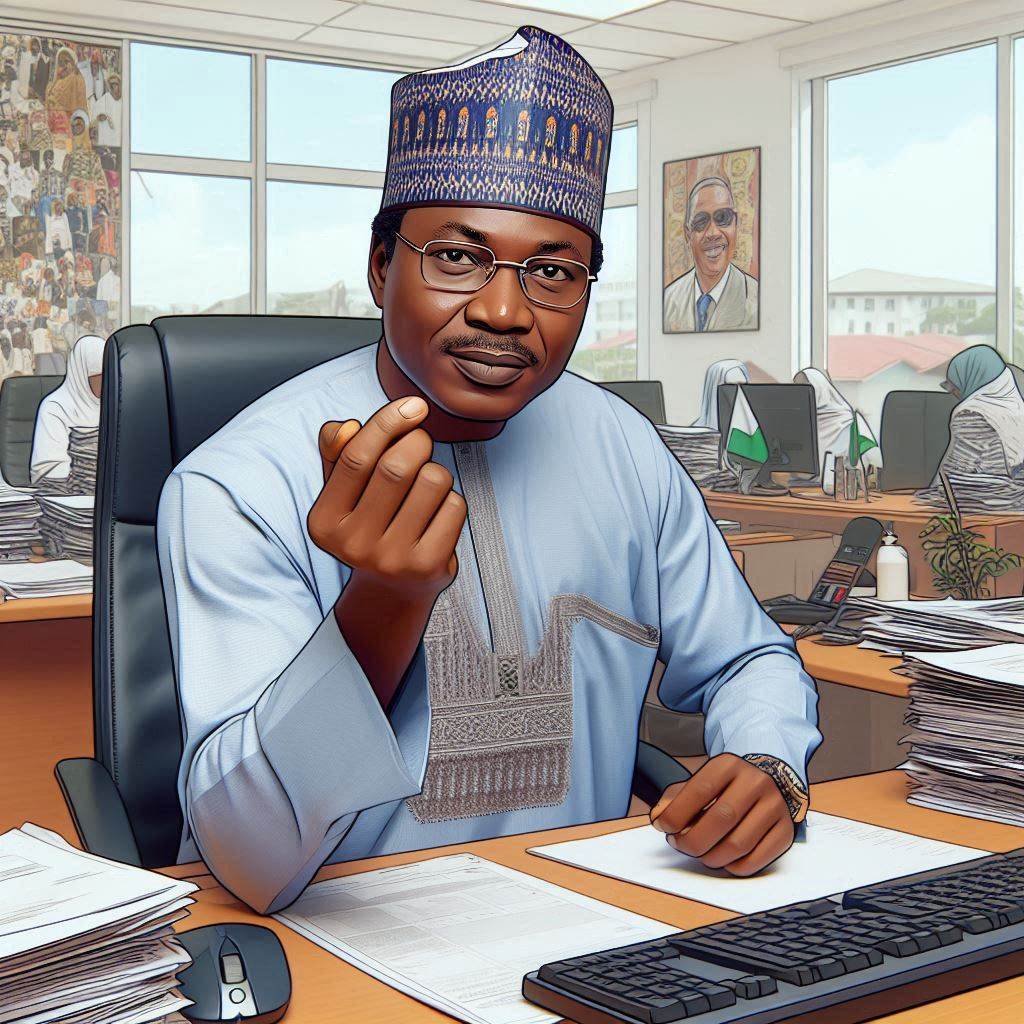Introduction
Comparative Politics, a multifaceted field, delves into the intricate workings of diverse political systems worldwide.
It meticulously examines structures, processes, and outcomes to unravel the complexities of governance.
Understanding these variations is pivotal for discerning patterns and trends in global politics.
Nigeria, a focal point of this analysis, presents a compelling case study.
As Africa’s most populous nation, Nigeria’s political landscape embodies a myriad of challenges and opportunities.
Its rich tapestry of ethnic diversity, historical complexities, and socio-economic dynamics makes it a fascinating subject for study.
Exploring Nigerian politics within the realm of comparative analysis offers invaluable insights.
It sheds light on issues ranging from democratic governance and ethnic tensions to economic development and social justice.
Through comparative studies, scholars and policymakers gain nuanced perspectives on governance models and policy efficacy.
This section embarks on an illuminating journey through Nigerian politics, unveiling layers of complexity and offering a deeper understanding of comparative politics’ broader implications.
Historical Background of Nigerian Politics
Nigeria, located in West Africa, has a rich political history that has been shaped by various events and transitions over the years.
Overview of Nigeria’s Political History
Nigeria gained independence from British colonial rule on October 1, 1960, marking the beginning of its political journey as a sovereign nation. The country has since experienced periods of military rule and civilian governance.
The First Republic (1960-1966) was characterized by a parliamentary system of government with political parties such as the Northern People’s Congress (NPC) and the National Council of Nigerian Citizens (NCNC) vying for power.
The Second Republic (1979-1983) saw the return to civilian rule after years of military intervention. The period was marked by political instability and economic challenges, leading to another military coup in 1983.
Discussion of Key Political Events and Transitions in Nigeria
Nigeria has witnessed several key political events and transitions that have significantly impacted the country’s governance and political landscape.
- The Nigerian Civil War (1967-1970): Also known as the Biafran War, this conflict was fought between the secessionist state of Biafra and the Nigerian government, resulting in a devastating loss of life and resources.
- Transition to Civilian Rule (1999): After years of military rule, Nigeria transitioned back to civilian rule in 1999 with the election of Olusegun Obasanjo as president. This marked a new era of democracy in the country.
- 2015 Elections: The 2015 presidential elections in Nigeria saw the first democratic transfer of power from one political party to another, with Muhammadu Buhari defeating incumbent president Goodluck Jonathan.
Impact of Colonialism and Post-Independence Governance on Nigerian Politics
Colonialism played a significant role in shaping Nigeria’s political landscape, as the country’s boundaries were determined by European powers without regard for the diverse ethnic groups and cultures within the region.
The legacy of colonialism contributed to ethnic tensions, which have often escalated into political conflicts and power struggles in post-independence Nigeria. This has had a lasting impact on the country’s governance and stability.
Furthermore, the history of military rule in Nigeria has had a profound impact on the development of democratic institutions and the rule of law in the country. The frequent coups and military interventions have hindered the growth of stable political institutions.
Basically, Nigeria’s political history is complex and has been shaped by a combination of historical events, colonial legacies, and post-independence governance challenges.
Understanding these dynamics is crucial for analyzing the current state of Nigerian politics and exploring avenues for future development.
Read: Language Arts Courses: What to Expect in Nigeria
Key Political Institutions in Nigeria
Nigeria’s political landscape is shaped by key institutions that play pivotal roles in governance and decision-making. Understanding these institutions is essential for grasping the dynamics of Nigerian politics.
Overview of Nigeria’s Political Structure
Nigeria operates under a federal system of government, comprising three tiers: federal, state, and local. The Constitution delineates the powers and functions of each level, ensuring a system of checks and balances.
Analysis of the Executive, Legislative, and Judicial Branches of Government
The executive branch, headed by the President, holds significant authority in Nigeria. It executes laws, formulates policies, and oversees the administration of the state.
The legislature, comprising the National Assembly, consists of the Senate and House of Representatives. It enacts laws, conducts oversight functions, and represents the interests of the people.
The judiciary, an independent arm of government, interprets laws and adjudicates disputes. It ensures the rule of law and safeguards constitutional rights. Together, these branches form the foundation of Nigeria’s democratic governance.
Evaluation of the Role of Political Parties in Nigerian Politics
Political parties are instrumental in Nigeria’s political landscape. They serve as vehicles for mobilizing support, articulating ideologies, and contesting elections.
However, Nigeria’s party system remains fluid, with parties frequently undergoing mergers, forming alliances, and experiencing defections.
The dominance of the People’s Democratic Party (PDP) for much of Nigeria’s post-military rule era gave way to increased competition following the emergence of the All Progressives Congress (APC) in 2013.
This transition marked a significant shift in Nigeria’s political dynamics, with parties vying for power and influence.
While political parties play a crucial role in shaping Nigeria’s democratic process, challenges such as factionalism, lack of internal democracy, and electoral malpractices persist.
Strengthening party institutions and promoting transparency in party activities are essential for fostering a vibrant and inclusive political environment.
Essentially, Nigeria’s key political institutions, including the executive, legislative, judiciary, and political parties, form the backbone of its democratic governance.
Understanding their functions, interactions, and challenges is vital for analyzing the complexities of Nigerian politics and charting the path towards democratic consolidation and socio-economic development.
Read: Internship Opportunities for Communication Arts Students
Political Culture in Nigeria
Examining cultural factors influencing Nigerian politics reveals a complex web of traditions and beliefs.
Ethnic diversity plays a significant role in shaping political dynamics within Nigeria, with various groups vying for power.
An analysis of political participation and civic engagement in Nigeria highlights the varying levels of citizen involvement.
- Traditional Influence: The cultural heritage of Nigeria impacts political structures and decision-making processes.
- Religious Factors: The interplay between religion and politics shapes governance and societal norms.
- Colonial Legacy: Historical influences from British colonization continue to impact Nigerian political culture.
Impact of Ethnic Diversity
The diverse ethnic makeup of Nigeria contributes to a complex political landscape with competing interests.
Political parties often align along ethnic lines, reflecting the deep-rooted divisions within the country.
Ethnicity can influence voting patterns and policy decisions, creating challenges for national unity and cohesion.
- Power Struggles: Ethnic tensions can escalate during elections, leading to violence and instability.
- Identity Politics: Politicians frequently leverage ethnic identity to mobilize support and gain power.
- Inclusion Efforts: Initiatives aimed at promoting inclusivity and diversity are critical to addressing ethnic disparities.
Political Participation and Civic Engagement
Citizens’ involvement in political processes is essential for a thriving democracy in Nigeria.
Voter turnout rates vary across regions, influencing the representativeness of elected officials.
Civic education programs can help improve awareness and participation in governance at all levels.
- Youth Empowerment: Engaging young people in politics fosters a more inclusive and dynamic political culture.
- Women’s Involvement: Enhancing the representation of women in politics is crucial for gender equality and balanced decision-making.
- Community Engagement: Grassroots movements and civil society play a vital role in holding government accountable.
Generally, understanding the political culture of Nigeria requires a deep dive into its historical, cultural, and social intricacies.
By addressing ethnic diversity, promoting political participation, and fostering civic engagement, Nigeria can strengthen its democracy and governance systems.
Read: Impact of Communication Arts on Nigerian Media

Find Out More: Postgraduate Options in African and Asian Studies
See Related Content: Popular African and Asian Studies Courses in Nigeria
Case Studies of Nigerian Political Issues
One of the key aspects of comparative politics is the analysis of specific political challenges faced by different countries, including Nigeria.
Examination of specific political challenges faced by Nigeria
- Nigeria has been dealing with challenges such as ethnic and religious tensions that have fueled political instability.
- The struggle for power among different ethnic groups has led to conflicts and often violent confrontations.
- The issue of corruption remains a major challenge in Nigerian politics, affecting all levels of governance.
- Corrupt practices have undermined the development of the country and eroded public trust in the government.
Analysis of corruption, security issues, and economic development
- Corruption in Nigeria has been a pervasive problem that has hindered economic growth and development.
- The mismanagement of resources due to corruption has led to widespread poverty and inequality in the country.
- Security issues, such as terrorism and insurgency, have also posed significant challenges to Nigeria’s stability.
- The Boko Haram insurgency in the northeast region has resulted in widespread violence and displacement of civilians.
- Economic development in Nigeria has been hampered by corruption, insecurity, and a lack of infrastructure.
Comparison of different approaches to addressing these issues in Nigerian politics
- Various approaches have been proposed to tackle corruption in Nigeria, including strengthening anti-corruption agencies and enforcing stricter penalties.
- Improving security in the country requires a comprehensive strategy that includes addressing root causes of conflict and improving law enforcement capabilities.
- For economic development, Nigeria needs to focus on diversifying its economy, investing in infrastructure, and promoting good governance.
- Comparative politics offers valuable insights into how different countries have addressed similar challenges, providing lessons for Nigerian policymakers.
In review, the case studies of Nigerian political issues highlight the complex challenges facing the country and the need for innovative solutions to promote stability, integrity, and development.
Read: Digital Media Trends in Communication Arts
Uncover the Details: Requirements for Music Programs in Nigerian Schools
Explore Further: Mass Communication Degree: Pros and Cons Nigeria
Discover More: Top Beauty Products Recommended by Nigerian Experts
Transform Your Career with Expert Guidance
Get personalized mentorship consulting that’s tailored to your unique path. Our expert advice is actionable and exclusive.
Get StartedFind Out More: Eco-friendly Art Practices in Nigeria
You Might Also Like: Innovative Nigerian Interior Designers
Delve into the Subject: Digital Art: Emerging Nigerian Artists Online
Comparative Analysis with Other Countries
When analyzing the Nigerian political system, it becomes crucial to compare it with other countries in Africa and beyond to gain a better understanding of its strengths and weaknesses.
By looking at different political institutions and practices in various countries, we can evaluate similarities and differences, as well as draw important lessons from such comparative analysis.
Comparison of Nigerian Political System with Other African Countries
- Nigeria vs. South Africa: Both countries have experienced issues with corruption in their governments, but Nigeria’s oil-rich economy sets it apart from South Africa.
- Nigeria vs. Kenya: Both countries have faced challenges related to election violence and ethnic tensions, but Nigeria’s federal system and religious diversity differ from Kenya’s centralized government.
- Nigeria vs. Ghana: While both countries have relatively stable democracies, Nigeria’s size and diversity make governing more complex compared to Ghana’s smaller and more homogenous population.
Evaluation of Similarities and Differences in Political Institutions and Practices
When comparing Nigeria with other countries, it is evident that there are both similarities and differences in political institutions and practices. One commonality is the struggle with corruption and weak governance, which is a pervasive issue across many African nations.
However, Nigeria’s unique blend of a federal system, multi-ethnic society, and complex religious dynamics sets it apart from its African counterparts.
Similarities
- Corruption is a common problem.
- Ethnic and religious diversity pose governance challenges.
- Election-related violence is a shared concern.
Differences
- Nigeria’s federal system versus centralized governments in other countries.
- Nigeria’s oil-dependent economy compared to other nations’ industries.
- Nigeria’s unique blend of ethnic groups and religious practices.
Discussion of Lessons that can be Learned from Comparative Analysis
By conducting a comparative analysis of the Nigerian political system with other countries, several important lessons can be learned:
- Importance of Strong Institutions: Countries that have robust political institutions are better equipped to combat corruption and ensure good governance.
- Unity in Diversity: Embracing diversity and promoting inclusion can help stabilize multi-ethnic and multi-religious societies.
- Democratic Resilience: Upholding democratic principles and institutions is vital in preventing election-related violence and maintaining political stability.
Overall, comparative analysis allows us to gain insights into the complexities of different political systems and learn from both the successes and failures of various countries.
By applying these lessons, Nigeria can strengthen its political institutions and practices to achieve sustainable development and inclusive governance.
Learn More: How to Choose the Best Foreign Language to Study
Discover More: African and Asian Studies Curriculum Overview
Conclusion
Summarizing the key points discussed in this blog post, we have explored the importance of comparative politics in understanding Nigerian politics.
By analyzing case studies, we have highlighted the various political dynamics and factors that influence decision-making in Nigeria.
Reflecting on the significance of comparative politics, it provides a valuable framework for comparing and contrasting political systems, institutions, and processes across different countries.
In the Nigerian context, this approach helps in gaining a deeper understanding of the complexities and challenges facing the country’s political landscape.
As we conclude, it is essential to consider further research and analysis in the field of comparative politics, specifically focusing on Nigeria.
By delving deeper into specific case studies and conducting comparative analyses, researchers can unravel new insights and trends that can contribute to better policy-making and governance in the country.
Scholars and policymakers should continue to explore this avenue to enhance our understanding of Nigerian politics and strive towards more effective and sustainable solutions for the nation’s development.




